Gyeongsang National University
Gyeongsang National University (GNU, 경상대학교) is a national university governed under the ministry of education of Republic of Korea government and located in Jinju, South Gyeongsang Province and represents the South Gyeongsang Province of South Korea as one of 10 Flagship Korean National Universities along with Cheju National University, Chonbuk National University, Chonnam National University, Chungnam National University, Chungbuk National University, Kangwon National University, Kyungpook National University, Pusan National University, and Seoul National University.
경상대학교 | |
| Type | National |
|---|---|
| Established | Founded 1948 |
| President | Kwon, Soon-Ki(권순기) |
| Location | , |
| Campus | Gajwa Campus (Main Campus), Chilam Campus, Tongyeong Campus, Changwon Campus |
| Website | http://eng.gnu.ac.kr/ http://gnu.ac.kr/ |
| Gyeongsang National University | |
| Hangul | 경상대학교 |
|---|---|
| Hanja | |
| Revised Romanization | Gyeongsang Daehakkyo |
| McCune–Reischauer | Kyŏngsang Taehakkyo |
Gyoengsang National University has twelve colleges such as arts, social science, natural science, engineering, agriculture and life science, management, veterinary, education, nursing, and medicine and eight graduate schools such as medicine and public health, business administration, education, aerospace, industry etc. Other institutions with the university are the university library, university museum, student center, university newspaper, broadcasting center, publishing company, institute for education of science talented, Korean language cultural center and so on. The current statistics of Gyeongsang National University shows that it has 1,681 academic staffs including 808 full-time professors, 361 administrative staffs and 24,502 students including undergraduate and graduate students enrolled. The university has three campuses and two of these are located in Jinju, South Gyeongsang Province and the other is located in Tongyeong. The main campus is located at Gajwa-Dong in the city of Jinju, Chilam campus, Jinju has the college of medicine, and Tongyeong campus, an hour from Jinju by car, has the college of Marine Science.
The motto of Gyeongsang National University(GNU) is Pioneer, and it states that the eyes of pioneers see far beyond the present to the future. The history of the university begun as Jinju Agricultural College founded in Jinju in 1948, then, accredited as national college in 1968 and in 1972, renamed as Gyeongsang National College. In 1980, the college was accredited as a national university by the ministry of education and renamed as Gyeongsang National University. For more than 60 years since its foundation, Gyeongsang National University has been educating talented students who have served not only for local community but also for national prosperity by leading them to be bigger asset in many places such as communities, industries, businesses and around the country and the world.
Gyeongsang National University is well known for many achievements in applied life science along with biochemistry, agricultural science, and veterinary. One of these is that the researchers at the university discovered a way to make cloned Turkish Angora cats glow red when exposed to ultraviolet light in 2007.[1]
The Graduate School of Medicine and Public Health at Gyeongsang National University is a medical training and research institution in South Gyeongsang Province. Gyeongsang National University Hospital was open with 419 beds in 1987 as the university hospital of Gyeongsang National University and is located next to the college of medicine in Chilam campus and has grown to a general and multispecialty medical hospital with 950 beds operating with specialty centers such as the local cancer center opened as the first local cancer center of its kinds in the country and rheumatoid arthritis center. Gyeongsang National University Hospital at Changwon is newly open as the second Gyeongsang National University hospital in February, 2016. The university hospital at Changwon has begun with 208 beds and is going to grow according to the number of patients hospitalized.
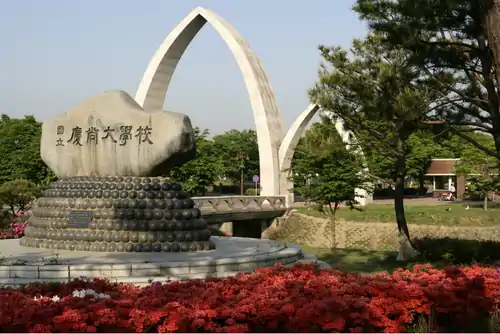
Overview of GNU's past and present
- October 20, 1948: Founded as Jinju Agricultural College by the provincial government of South Gyeongsang
- July 11, 1972: Accredited as Gyeongsang National College
- March 1, 1975: Established the graduate school
- March 1, 1980: Accredited as Gyeongsang National University by the government of Republic of Korea
- March 1, 1983: Established the College of Medicine
- February 21, 1987: Inaugurated the Gyeongsang National University Hospital
- March 1, 1988: Established the Graduate School of Business and Public Administration
- March 1, 1989: Established the College of Veterinary Medicine
- March 1, 1993: Established the College of Business Administration
- March 1, 1995: Established the College of Marine Science by merging the Tong-Yeong Junior College of Fisheries
- March 1, 1996: Established the Graduate School of Industry
- March 1, 2010: Graduate School of Public Health established
- December 16, 2011 : Dr. Kwon Soon Ki appointed 9th President
- March 1, 2014: GNU has 10 Graduate Schools, 12 colleges, 3 Divisions (5 majors) and 87 Departments, with a total of 3,252 new Students every year
Campus
Gyeongsang National University has four campuses. Two campuses are located in Jinju, one campus in Tongyeong, and one campus in Changwon. Gajwa campus is located in Gajwa-dong, Jinju close to the junction of Tongyeong–Daejeon Expressway and Namhae Expressway, Chilam campus is located in Chilam-dong right next to Nam River, Tongyeong campus is located in Inpyeong-dong, Tongyeong, and Changwon campus is located in Uichang-gu, Changwon.
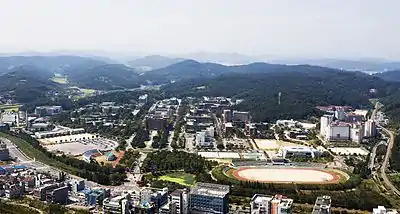
Gajwa Campus
Gajwa campus is the main campus of Gyeongsang national university. Most buildings and facilities of the university including the university headquarter, the student center, and buildings for the colleges of Arts, Social Science, Law, Education, Business Administration, Natural Science, Agriculture and Life Science, Engineering, Veterinary, and graduate schools are located in the campus. The area of Gajwa campus is more than 1,300,000㎡, and buildings numbered are more than sixty .
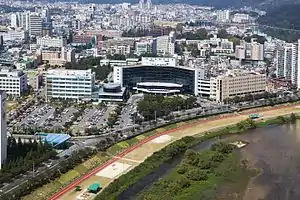
Chilam Campus
The gyeongsang national university hospital, unique facility for training of medical students and nurses, are also located in the campus. The area of the campus is 103,000㎡, and buildings such as dormitory, student center, and the medical library, are located.
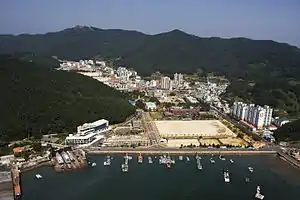
Tongyeong Campus
The college of Marine Science is located in Inpyeong-dong, Tongyoung. The campus is home of ten departments for marine science in the college and has fifteen buildings including the college headquarter, education and research center, gym, library, student center, and female dormitory. The area of the campus is 147,000㎡.
Changwon Campus
Changwon Campus is Industry-University Convergence campus and founded in 2017. Department of Mechanical Convergence Engineering is the only department that is located in Changwon Campus. The Department of Mechanical Convergence Engineering, a leading university in the 4th industry, will grow into a cradle of global industrial technologies and human resources such as smart factory, IoT, and artificial intelligence (AI) based on the machinery industry.
Academics
- College of Agriculture and Life Science
School of Agriculture and Life Science : Agriculture, Animal Life Science, Food Engineering, Plant Science, Applied Biology and Environmental, Animal Biology, Environmental and Life Chemistry, School of Environmental and Forest Science:, Department of Agricultural Economics, Department of Bioindustrial Mechanical Engineering Department of Regional Environment Engineering
- College of Law
Department of Law
- College of Education
Department of Education, Department of History Education, Department of Physics Education, Department of Mathematics Education, Department of Physical Education, Department of Ethics Education, Department of Geology Education, Department of Chemistry Education, Department of Computer Education, Department of Korean Language Education, Department of English Education, Department of Biology Education, Department of Art Education, Department of Sociology Education, Department of Japanese Language Education, Department of Home Education, Department of Music Education - The Department of Computer Education and the Department of Home Education are gone.
- College of Veterinary
Department of Veterinay, Department of Preveterinary Medicine
Chilam Campus
- College of Nursing
Department of Nursing
- College of Medicine
Tongyeong Campus
- College of Marine Science
Department Marine Civil Engineering, Department of Marine Biology, Department of Mechanical System Engineering, Department of Marine Engineering, Department of Marine Environment Engineering, Department of Marine Food Engineering, Department of Energy Mechanical Engineering, Department of Marine Manangement, Department of Marine Police System, Department of Information and Communication Engineering
Changwon Campus
- Headquarters Campus
Department of Mechanical Convergence Engineering
Graduate Schools of Professional Studies
- Graduate School of Medicine
- Graduate School of Business
- Graduate School of Education
- Graduate School of Convergence Science & Technology - The Graduate School of Convergence Science & Technology was established to develop leading professionals in industrial technology. At present, Master's degrees are offered in 29 majors from nine departments (evening classes only). Two contract departments and a non-degree course for advanced industrial management are also available.
- Graduate School of Public Administration - Developing professional contributors to national and regional development is the main objective of the Graduate School of Public Administration. The School also provides continuing education to people who currently hold positions in government administration, and a non-degree course for advanced administration management.
- Graduate School of Aerospace Specialization - The Graduate School of Aerospace Specialization was established through collaboration among Gyeongsang National University, Korea Aerospace Research Institute, and Korea Aerospace Industries, Ltd., to develop technology and human capital in the national aerospace field.
- Graduate School of Public Health
- Graduate School of Food & Medicine
Master's Programs
- Humanities and Social Sciences
- Natural Sciences
- Engineering
- Medicine
- Arts and Athletics
- Interdisciplinary Departments
- Industrial-Academic Collaboration
- Contract Department
PhD Programs
- Humanities and Social Sciences
- Natural Sciences
- Engineering
- Medicine
- Arts and Athletics
- Interdisciplinary Departments
- Industrial-Academic Collaboration
Joint Masters and PhD Programs
- Humanities and Social Sciences
- Natural Sciences
- Engineering
- Medicine
- Arts and Athletics
- Interdisciplinary Departments
School of Language Education and International Programs
- International Exchange Programs Gyeongsang National University has international exchange programs and partner universities with many universities and institutions around the world. In Asia, 49 universities in Australia, Cambodia, China, Hong Kong, India, Japan, Philippines, Taiwan, and Vietnam are affiliated with the university, and Kyoto University, Nagoya University, Osaka University, and University of Tokyo are some of 17 universities in Japan. In America, 18 universities including University of North Carolina, Purdue University, University of Washington, and University of Wisconsin–Madison in the u.s. and Canada are affiliated with the university. Especially, Gyeongsang National University has joint PhD. programs with Purdue University[2] and University of Missouri[3] and has research labs operated at Purdue University and the Scripps Research Institute in the u.s. Gyeongsang National University has sent graduate students and professors to conduct research in biomedical and applied life science jointly with the universities and research institute. In Europe, the universities in England, France, Germany, Italy, Netherlands, Poland, Russia, and Uzbekistan, including Leipzig University in Germany and Moscow State University in Russia are affiliated with Gyeongsang National University and the university has joint symposiums with Max Planck Institute for Plant Breeding Research in Germany.
GNU Affiliated Institutions
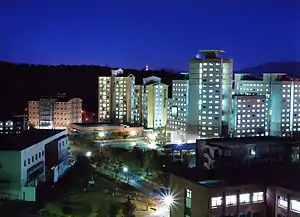
- Dormitory The dormitory is operated aiming at developing a true pioneer by means of discipline and systematic community life under the precept of "Love, Intelligence and Creation." It was renamed from "Dormitory" to "Residence Halls" on June 1, 2004 to create it as rather a cultural living space than just a simple meaning of providing accommodation and food. Expanded to BTL dormitory, from March 1, 2009 residence Halls accommodate 3,254 students in 10 buildings and do best to promote students' academic endeavor in such a cozy and convenient environment like their home. In addition, residence halls supply quality meals and are equipped with cinema room, lounge, etc., for leisure, including a newly built fitness center with health club, billiard club and table tennis club.
Research Institute
Humanities & Social Sciences
- Research Institute of Gyeongnam Culture (RIGNC) - RIGNC discovers and systematizes ancient documents regarding the history and culture of Gyeongnam.
- Education Research Institute (ERI) - ERI consists of the Research Center for Secondary Education, the Research Center for Science Education, the Research Center of Sports for All, and the Center for Multicultural Education.
- Institute of Global & Area Studies (IGAS) - IGAS focuses on education and supports research, unification and peace in overseas areas.
- Institute for Social Sciences (ISS) - ISS engages in research activities through collaboration with industry and systematic connection with the realms of social science, business, and economics. EU Institute The EU Institute strives to globalize Gyeongnam through exchange activities with EU regions.
- Institute of Humanities (IH) - IH consists of Korean, oriental, and western studies.
- Institute of Law (IOL) - IOL studies domestic and foreign law and operates a legal advisory service.
- Research Center for Women (RCW) - RCW mainly promotes interdisciplinary research and program development about women's issues. Research Center for Management & Economics The Center studies management, commerce, and international and local economics.
Life Sciences & Engineering
- Research Institute of Life Sciences (RILS) - RILS engages in research activities focused on genomics, proteomics, cancer, and biological engineering.
- Plant Molecular Biology & Biotechnology Research Center (PMBBRC) - PMBBRC expands foundational knowledge of plant science at the molecular level towards development of future food resources.
- Engineering Institute (EI) - EI participates in support projects for joint academy-industry-laboratory technological development, support projects in science and engineering, and shared use of research equipment.
- Institute of Agriculture & Life Sciences(IALS) - IALS researches the development of technologies in agriculture & life sciences, with appropriate management techniques. Institute of Health Science (IHS) IHS engages in research and education on the causes and prevention of disease.
- Research Institute of Natural Science(RINS) - RINS focuses on research in specialized fields through government support.
- Veterinary Medicine Research Institute(VMRI) - VMRI develops new technologies for diagnosis, prevention, and cure of animal diseases and medicine for treatment, and focuses on basic and applied veterinary sciences for animal environment and hygiene.
- Research Center for Aircraft Parts Technology (ReCAPT) - ReCAPT studies basic and applied research on aircraft design and manufacture, and aircraft materials.
- Institute of Marine Industry (IMI) - IMI develops marine industry-related academics and applied technology. Environmental & Regional Development
- Institute (ERDI) - ERDI focuses on research and services for development of the environment and local communities. Green Energy Fusion Laboratory The Laboratory studies and develops green energy technology including bio-energy and wind power.
University Presidents
- Dr. Hyun-cheon Shin, March 1980 - 1987
- Dr. Jeong-han Lee, March 1987 – 1991
- Dr. Young-ho Bin, March 1991 – 1999
- Dr. Choong-saeng Park, March 1999 – 2003
- Dr. Moo-je Cho, December 2003 - 2007
- Dr. Woo-song Ha, December 2007 - 2011
- Dr. Soon-kee Kwon, December 2011 – 2016
- Dr. Sang-Kyoung Lee, June 2016 – 2020
- Dr. Soon-kee Kwon, December 2020 – Present
Notable People, Faculty, and Alumni
- Kim, Su-Jung (김수정), comic artist, the creator of comic and animation, Dooly the Little Dinosaur, and the products
- Park, Hong-Soo (박홍수), politician, former minister of the Ministry of Agriculture and Forestry
- Baek, Hyo-Hum (백효음), businessman, former president of China Hyundae Motor company
- Suh, Doo Chil (서두칠), businessman, former CEO of Hankuk Electric Glass, Co
- Yoo Ye-bin (유예빈), Miss Korea 2013,[4] undergraduate student majoring in textiles as of 2013.
- Cho, Moo Je (조무제), professor, president of Ulsan National Institute of Science and Technology
- Choi, Young Tae (최영태), businessman, founder and CEO of Nadri, Inc.
- Ha, Jin-Hong (하진홍), businessman, former CEO of Jinro
- Huh, Tae-Hak (허태학), businessman, former CEO of Samsung Everland and Hotel Shilla of Samsung.
See also
References
- "Glow in the dark cat could help cut disease". the telegraph. 2007-12-13. Retrieved 2014-10-30.
- 경상대 생명과학분야 복수박사학위제 국내 최초 도입 in Korean Archived 2014-11-01 at the Wayback Machine
- 경상대학교-미국 미주리대학교 복수박사학위제 협정 체결…퍼듀대 이어 2번째 in Korean
- Miss Daegu crowned Miss Korea 2013
